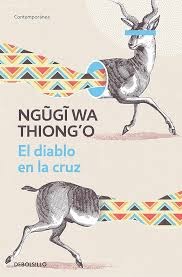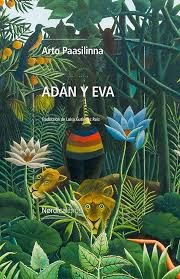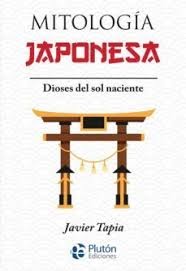
Original Language: Kikuyu o gikuyu
Títutulus original: Caitaani mũtharaba-in
Translation (from English): Alfonso Ormaetxea
Year of publication: 1980
Valoración: It would have to be original Kikuyu to be able to make a fair assessment.
The devil on the cross It is a very special book, something totally unexpected in Europe and in the rest of what is known as the western world. It was the first book that Ngugi wa Thiong’o wrote in his mother tongue, in Kikuyu or Gikuyu. He wrote it for the peoples of his native culture, regardless of him that he could have other possible readers. That makes all its first part be confusion to those who are not native to the Kikuyu culture. He also wrote it thinking about those who do not know or do not want to read in English and for those who recommend that they read and write in their mother tongue. Perhaps there were very few that 1980, year of their first edition, knew how to read Kikuyu. How many books written in that language would exist at the time? As Thiong’o himself tells us, in Kenya’s schools, when he studied in them, Kikuyu was forbidden to speak; Educating was teaching to speak, read and write in English.
In some of his works written in the language of the colonizers, books that gave him a very deserved fame, NGGI proposes Decolonize the mind and write a thesis to boost writing in the languages of the original inhabitants of Kenya. Whom The devil on the crossThiong’o does not propose, does it and chooses extremely popular characters and customs to demonstrate to his people what he considers of paramount importance: with the colonizers a system made to steal and depred, which managed to settle managed by those who were in charge of the country, at the service of the ancient colonizers, after political independence, arrived in Kenya.
To us, the “Western”, the first part of the novel seems to us not only an irony, rather we see it as a grotesque mockery of the economic system in which we live. From our cultural corner, we prefer to read, to criticize the system, to brave thinkers: Marx, Arendt, Althusser, Habermas, Zizek. And the commentators give maromas to defend a great writer who wrote, to talk about the prevailing economic system, what the illegal drivers of public transport most used in our marginal neighborhoods say. Definitely Thiong’o did not write The devil on the cross For us how to judge from our egocentric culture who writes for a culture that could save us from our biosphere ourselves?
Intriguerated, still without understanding and annoying for the grotesque of the teasing, I continued reading the novel until the end and appeared, it could not be otherwise, the magic of Nugi, with which, to one of the protagonists, a woman of the town, converts it, without harass, with a huge simplicity, in the symbol of the Kikuyu people: beautiful, which proudly wears her tradition Sure of herself, who assumes her past where she was cumbersome without denying him, loving the daughter of that past and firm in the defense of a future of whose construction will be responsible, overcoming any difficulty: Wariinga, the Kikuyu woman who represents all her hometown, by magical art of Nugi wa thiong’o.
Signed: David Batista
Source: https://unlibroaldia.blogspot.com/2025/06/colaboracion-el-diablo-en-la-cruz-de.html


